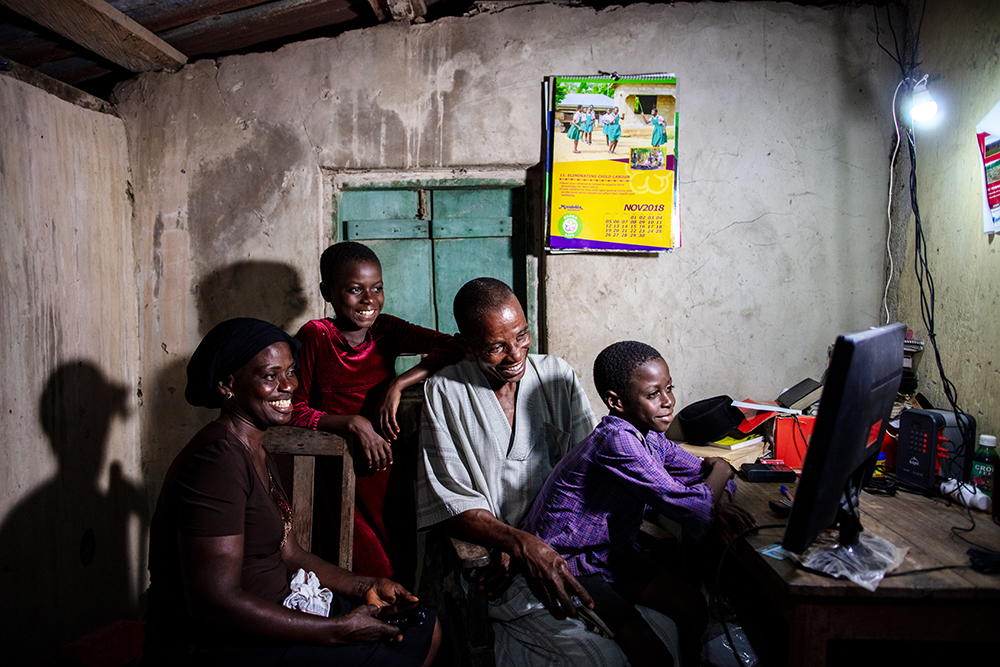How the PAYGo solar sector can prepare for the coronavirus and keep the lights on

Many parts of the world are currently locking down in an intense effort to contain COVID-19 before it takes too many lives. These have created dramatic – albeit necessary – economic effects. With these immediate impacts and near- to medium-term uncertainties in mind, we spoke to four PAYGo operators this week to understand how the pandemic is impacting their customer base and operations, and how they are responding. This post explores how the pandemic may impact these operators and their customers, and introduces ways providers can prepare for and mitigate negative impacts on their operations and portfolios.
Let’s start with those most vulnerable to the impact of COVID-19: PAYGo customers
Various characteristics of PAYGo households make them especially vulnerable to the negative impacts of the pandemic, which will likely affect their ability to pay for services. To start, these households tend to be rural and lower- to middle-income. Rural areas, on average, have a much harder time accessing necessary healthcare and will be especially vulnerable to the pandemic. Infections and social distancing may also create changes in food availability, forcing PAYGo customers to make difficult financial trade-offs. If customers or their family members are exposed to the virus there might be a near-term need for funds to cover medical costs – they will have to dip into savings, reduce consumption, liquidate assets, or take on new economic activities. Travel restrictions will make it more difficult to reach mobile money agents or other pay points, which could affect income from remittances and the ability to cash-in to digital wallets. Those same remittances are likely to be restricted as relatives in cities or overseas see their own incomes reduced by layoffs or furloughs.
Together these circumstances could drive a spike in non-payment for MSME lenders, which could lead to a credit crunch in rural areas, affecting micro-entrepreneurs’ ability to keep their shelves stocked. Non-essential investments and consumption will likely fall off considerably.
Issues facing PAYGo operators
PAYGo customers are the ones most vulnerable to this pandemic, and our concern and attention should be on supporting them as much as possible, especially with acute health and financial issues. With that said, companies can expect to face serious headwinds in the coming months, including some or all of the following: runway issues, supply chain delays, invoices payable issues, staff management and capacity problems, and growth slowdowns.
These can be broken down into three buckets: supply, demand, and capacity.
Supply
Providers we have spoken with are not facing major stock issues at the moment, having already made significant orders for Q2 and Q3 in advance of the Chinese lunar new year. With many factories in East Asia coming back online, the capacity to produce exists, and disruptions to supply may be minimal although it is vulnerable to flare-ups.
More pressing are issues around shipping and importation. There are still internal shipping constraints in China, as well as queues of backlogged orders to ship out by boat or plane. Many governments are closing borders during the crisis; this does not appear to be affecting the flow of goods, but critical supplies are likely to get priority, and staff shortages at ports could affect timely arrivals.
Demand
Customers dealing with illness and/or income slowdowns may decide to prioritize other needs above lighting. Customers who still want to pay may struggle to do so if mobile money networks are down or agents are unavailable. And the environment of uncertainty may make people hold off on bigger investments or financial commitments. End result: we should expect high levels of nonpayment and slowed sales growth, even in areas that are less severely affected by the virus.
Capacity
Given these issues, we expect firms in this sector are going to face the same cash crunch affecting many businesses. Revenue will reduce, obligations may not, and runways will get shorter. At the same time, workspaces will be shifting to distributed operations: headquarters, sales points, distribution centers, and most importantly call centers will be run from employees’ homes for the next few months at least. Most available time and resources will be devoted to managing the crisis, although firms should keep customer outreach channels open and begin planning for the future as soon as possible.
Decisions on employees are among the hardest that firms will face. There may be opportunities to refocus agents and sales staff towards more remote service and call-center roles, and this can be an efficient way to keep a workforce together. But there is not likely to be sufficient work for everyone. If layoffs and/or furloughs are necessary, the main issues are how to make and communicate those decisions with fairness and empathy, to ensure that staff has some financial runway of their own, and to maintain regular check-ins and strong relationships for the day that operations get moving again.
On the finance side, servicing debt on time could become a problem for many firms. There is the possibility of relief – governments may respond by eliminating interest on loans or placing a hold on loan repayments for a period of time. The Central Bank of Nigeria gave banks permission to “consider temporary and time-limited rescheduling of the tenor and loan terms for businesses and households most affected by the outbreak of COVID-19 particularly oil & gas, agriculture, and manufacturing.” Other governments have taken similar measures.
However, most debt to the off-grid sector still comes from foreign entities, which could have political implications. As developing country governments prioritize sectors for assistance, they may consider foreign-financed energy firms to be less deserving of financial support. Likewise, donor countries may choose to focus their relief efforts on firms that employ and serve their own polities. If there is to be a bailout for PAYGo solar, it may need to come from the industry itself.
For non-operators in the industry, services that rely on operator fees may see requests for forbearance and extensions, creating another cash crunch. Deal-flow for investors is likely to take a backseat to more immediate problems with debtors and investees. On-site diligence and non-essential contracting processes will likely be delayed. And, if the economic impact is long-term, public sources of funding for the sector could be curtailed in order to fund domestic stimulus efforts.
How can operators react? We propose that operators consider three stages: 1. Immediate Response, 2. Getting Back on Track, and 3. Next Gen PAYGo. This post will focus on the immediate response, while subsequent posts will address steps 2 and 3.
Immediate response
In the near-term (next two to three months) operators can expect a moderate level of uncertainty given the risks highlighted in this post and can take proactive and preventative actions now to mitigate or reduce the potential negative impacts on their customers and operations. These include supporting customers, gathering and sharing information, and redesigning operations.
- Keep the lights on for your customers. Modern energy is an essential service that improves quality of life, enables new education and livelihood opportunities, and connects people with critical information. As a first step, providers are testing promotions (buy X get Y free days) to incentivize customers with the ability to prepay for large chunks of time. Providers should also consider immediate offers of free energy days/weeks for clients who are otherwise in good standing but struggle to pay during the pandemic and prepare for widespread rescheduling of loans. One PAYGo CEO told us there is “high potential for this to be a giant sh**show.” If that potential comes due, then the most important thing is to be there for your customers. That loyalty may be rewarded by them post-crisis, or it may not – it is still the right thing to do.
- Prepare your workforce. Operators will need to immediately order headquarters and field staff to work remotely, if they have the capability to do so, to limit their risk of exposure. Using all available resources operators should educate their staff, contractors, and commission-based agents on proper hygiene and social distancing practices, and consider providing ongoing updates on the impacts in your markets of operation as well as the company’s response. To support a swift shift to remote work operators should prepare to sign up for conference calling services at a larger scale, acquire and distribute internet bundles for the team, and deploy all available company smartphones and laptops to support staff now working from home.
- Gather and share information. As a next step, operators could design and deploy surveys with their existing clients to examine how COVID-19 may be disrupting their lives. These surveys could measure customers’ level of awareness of the pandemic and mitigation efforts in their communities, how they are preparing to respond, and what tools they may use to meet financial obligations if and when their livelihoods are impacted. Given the work-from-home and travel restrictions already in place in most markets, these surveys could be designed remotely and executed via phone. While the primary objective is to gather insights to inform company-specific action, there is significant potential for this work to support and integrate with other efforts, in and outside of the energy sector. Where possible providers should explore opportunities to share insights from this research with existing partners, local government and relevant stakeholders, and where comfortable with industry groups such as GOGLA. Or you can share it with us – we’ll get the word out!
- Stress test your model. This pandemic holds the potential to impact multiple aspects of the PAYGo model, at levels that are difficult to predict accurately given the speed with which things are changing globally. While there is no one-size-fits-all approach, operators should individually define the stress testing scope that’s relevant to their business, defining risk scenarios (i.e. XX% of systems become delinquent, YY% of outstanding credit is not paid back, ZZ% of their customers are hospitalized, and all of the above happens) with varying severity and duration of risks that are most appropriate to their market contexts. Operators should combine this with a planning exercise to prepare a package of contingency measures across business functions, from marketing to customer service to human resources.
- Adjust Operations. As PAYGo providers shift staff to remote work there will be an immediate need to rethink core pieces of operations. To preserve the company’s financial runway and limit face-to-face interactions providers should consider dramatically slowing sales and re-orienting those teams to support other functions in the business. For example, inactive staff could be retrained to serve as remote customer service or call center reps.
- Extend your runway. As many PAYGo operators are on the path to profitability, it’s essential to put in place measures that can serve to extend your financial runway, and to anticipate that equity fundraising will take much longer than normal as investors also rush to adjust their own operations and processes for remote work. This is also an opportunity to proactively communicate with investors and funding partners to make them aware of how the company is responding to the crisis, and to highlight and discuss new solutions that might be needed in the near-to-medium terms to keep the lights on internally and prepare for a return to normal when possible.
Sector-wide impacts: investors, service providers, non-profits
Just as operators need to be ready to help their customers and staff, we need to be ready to help operators. Service providers, particularly CRM, IT, and logistics companies, will need to bootstrap their way through this crisis, in much the same way as operators.
For investors and lenders, this is a moment to shine. Tim Ogden, Managing Director of the Financial Access Institute at NYU Wagner, had this to say in his weekly newsletter about the impending crisis in microfinance. We endorse it, heartily:
“I’m very curious…what it will take for the global microfinance industry to survive. At a minimum, it’s going to provide an opportunity for all those ‘social investors’ to prove whether they meant any of the rhetoric. I don’t have a plan but I do have an idea: everyone claiming to be a social investor in microfinance should immediately turn all their debt capital to 0% interest and suspend any payments for 12 months. And they should be preparing to provide more capital and helping MFIs merge.”
Of course, this would require forbearance at both an individual investor and a collective level; for a debt fund to forgive interest and suspend payments from companies, for example, the fund’s partners would need to do the same for the fund itself, perhaps requiring its legal structure to be rewritten.
The sentiment, at least, is echoed within the PAYGo industry. Avi Jacobson, Investment Officer at SunFunder, a specialized debt provider to the off-grid sector, told us, “There are a lot of moving pieces, but there will definitely be cases where proactive rescheduling of loans to avoid major cash outflows during the coming months will make a lot of sense. We are in this together.” He mentioned one company that is working with its shareholders to raise and create a buffer that will keep staff paid through a two- to three-month shutdown.
What are some productive ways PAYGo operators could use this time?
While the near-term is likely to be consumed with crisis management and setting up distributed operations, there may be an extended period of limited activity. This could be an opportunity to develop a better understanding of what parts of the business work efficiently, and which have become path-dependent over the years. Distributed operations may offer a clue into what parts of the business can be done remotely. This may also be an ideal time to digitize processes that are manual or rely on in-person interactions. At the same time, this is a chance to improve communication with customers and develop a better holistic understanding of their financial lives, decision-making, and broader financial needs.
Conclusions
This is a crisis. Decisions must be made quickly, and not all of them will be correct. If there will be errors, better that they come from sharing too much information and from doing too much to protect people (both customers and staff), as opposed to not enough.
At some point – we hope – this crisis will peak, abate, and pass. Each of us will need to adjust to the new landscape, and out of necessity or opportunity, we will begin re-imagining our roles in it. There is never a bad time to begin preparing for that day when offices re-open and the lights come back on.
After the quick decisions are made, after teams are moved off-site and staff are safe, the next questions will be around how we – operators, investors, all of us – can support customers to recover from this crisis. Informal economies can be vulnerable to crises but are able to quickly spring back and catalyze broader recovery. The off-grid sector can help to power that comeback, while still educating customers on the need for safeguards and vigilance. In subsequent posts we will discuss the re-start: how companies can restart sales, reinstate collections, and reignite growth.
For now, we wish everyone safety, good health, and courage throughout this crisis. We are in this together.



